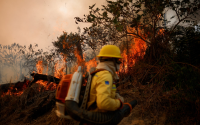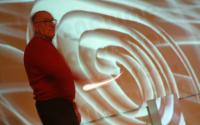24 December 2007
In the dark of a one-room shack, a new-born baby sleeps in the arms of a young mother. It could be a biblical scene. The glow from a kerosene lamp gives the mother a halo. Add an ox, a lamb and a manger, and this could be the story of Christmas, a painting of the Madonna and Child from the Middle Ages, or the living crib assembled by St Francis in the 13th century.
Eyes shut, arms thrown back, the infant looks relaxed. She doesn't know that this is the toughest place in the world to be born on Christmas Eve. It's a six-hour flight from London but here, in the moist, hot, mosquito-blown air of this corner of Africa, Salamatu Sankoh was born by candlelight in conditions barely advanced since the time of Christ. Life's lottery has delivered her to a slum in Sierra Leone. In some ways, you could call her the unluckiest baby in the world.
Sierra Leone should be a scandal, a scar on the conscience of a world which, seven years ago, promised to eradicate extreme poverty, cut child mortality by two thirds and improve maternal health by 2015. Halfway to that deadline, conditions for babies born this Christmas in the 10 toughest places for a child are still devastating. And Sierra Leone comes top on that list.
The west African state ranks bottom (177th out of 177) on the UN's human development index. One in four children dies before the age of five, the worst infant mortality rate in the world. The health system is on its knees. Nearly all medical staff fled during an 11-year civil war. Five years on, there are still fewer than 10 surgeons for the entire country.
The children of Kroo Bay, the Freetown slum where Salamatu entered the world, are arguably worse off than any others in Sierra Leone. Yet even here, there is hope. The resilience of the people, a democratically elected government and the help of Save the Children, one of the charities The Independent's Christmas Appeal is supporting, can be thanked for some first signs of progress.
When Graham Greene lived in Sierra Leone, the setting for his novel The Heart of the Matter, Kroo Bay was a small fishing harbour. From a distance, with its tall trees fringing the Atlantic Ocean, it has a lush beauty. Close up, Salamatu's new home looks and smells like a landfill site. The homes of 6,000 people sit amid mounds of silt and rubbish. Pigs, knee deep in the filthy river that runs through the shantytown, root greedily in the waste and refuse. Rats scurry before your feet.
Salamatu's safe birth and her mother's survival were far from guaranteed. One in six mothers here dies in childbirth. (In the UK, the rate is one in 3,800).
At Kroo Bay's only dilapidated clinic the lone delivery bed has a rusty iron frame. There are a couple of plastic garden chairs and the sole cot has only three wheels. Staff don't even dream of a doctor. They would be happy to have a bedpan, surgical spirits, cotton wool. The most pathetic entry on their typed four-page wish list must be "one hurricane lamp". The clinic has no electricity, let alone pain relief for the women in labour. "The nurses got hold of a pair of forceps but there is no steriliser, we can only boil water to disinfect things," says Adama Gordima, head of the clinic.
If a new mother develops complications, neither Bintu Koroma, the overworked midwife, nor Mammy Soko, a trained attendant, can do much but refer her to the nearest big hospital 4km away. But the £20 admission charge is out of reach for most.
Salamatu risks serious illness from an early age. Kroo Bay has just one latrine so human waste goes directly into the river. The same water is used for washing clothes. As a toddler she may have to sort through broken glass or blades in the rubbish, risking infection. That would be bad enough. But for three months of the year it rains. That's when the absence of any public rubbish collection in Freetown turns Kroo Bay turns into a fetid swamp.
Rubbish clogs the drains, filthy water backs up in the walkways and sweeps into the shacks. Salamatu will go to bed at night with floodwater washing beneath her. Typhoid, diarrhoea and cholera come with the floods. Flies, cockroaches, and rats breed in the garbage and spread disease. The blocked drains are a breeding ground for mosquitoes.
Perhaps like Khadija Turay, five, Salamatu will sit in the waiting room of the clinic aching with malaria. "She is tormented by fever," her father tells me. "We have bed nets but they are old and full of holes and maybe we put them down too late in the day" he admits. One course of malaria treatment is cheap at £1.50, but the average daily income for the majority of Sierra Leoneans is just £1.
Even if Salamatu lives beyond five, the time she has for the things of childhood will be short. It's rare to see a toy. Children have to work, they fetch water, look after the younger ones. Like 12-year-old Abdulam Kamara, the son of a neighbour, she may have to go out to work full time. Abdulam, a serious boy who longs to be back in school where he says he loved "short stories and English compositions", sells water in the streets of Freetown.
But Salamatu's story could also have a different ending. After decades of mismanagement, Sierra Leone has a new democratically elected government. With unspoilt beaches and pristine rainforest some even believe that with investment, the country could be a travel destination to match Mauritius or the Seychelles. Save the Children has begun to assist with the rebuilding.
And the people of Kroo Bay are far from helpless. There's an air of intense activity about their community. Abdulam the child water-seller, Bintu the midwife, Mammy Soko and the other slum dwellers are survivors. They moved here to escape war. Now, everywhere you look, someone is cooking, washing, hawking things to sell, fetching water, sewing, cutting hair, scraping a living. There's no choice. For the privilege of living in these shacks built on the city's rubbish, residents have to pay rent – and money for every trip to the doctor has to be found.
Some of their problems would be easy to solve. Immunisations, tetanus jabs, bed nets, rehydration salts are not expensive, and education about hand washing, covering food and other disease prevention steps would transform lives. With the right help, life could be dramatically better by the time baby Salimatou is a little girl.
Next month, Save the Children will begin upgrading the Kroo Bay clinic. The women in labour will get more privacy, as well as equipment; forceps, drip stands, saline solution and a few proper delivery beds.
This is about far more than bandages however. In the longer term the aid agency is trying to convince the Sierra Leone government, and Western governments, that scrapping health charges for the poorest people could save 7,000 children a year.
In parallel, a clean-up campaign will be integral to tackling the atrocious conditions that are killing so many. A coalition of aid agencies will dredge the rivers and stop the flooding, as well as campaigning for an end to indiscriminate rubbish disposal in Freetown.
Save the Children is hopeful that now Sierra Leone has a stable government, the aid will be transformative. The new Presiden, Ernest Bai Koroma, has promised to target corruption.
"Leadership is fundamental" says Dieneke Van der Wijk of Save the Children. "When you have it, then absolutely, there is hope".
Until then, Salamatu will need a lot more luck on her side.
http://news.independent.co.uk/world/africa/article3280437.ece






